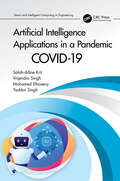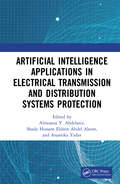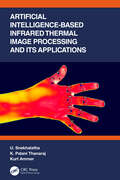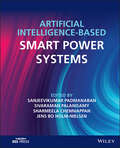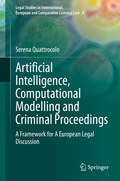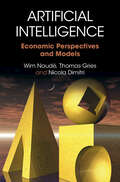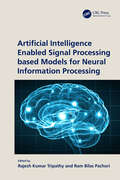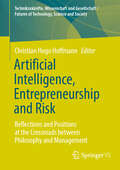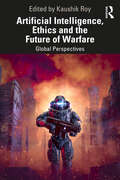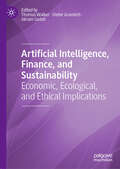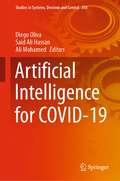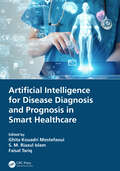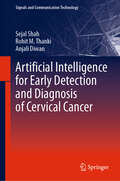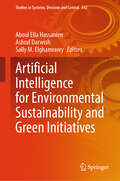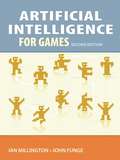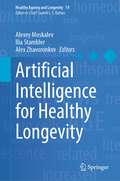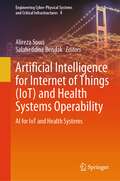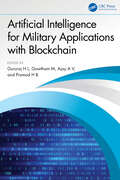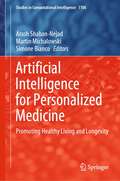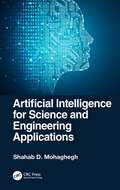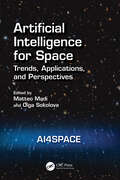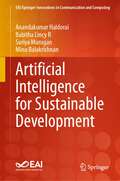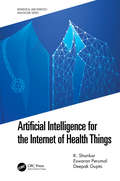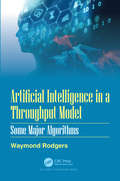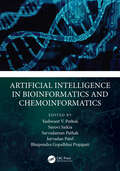- Table View
- List View
Artificial Intelligence Applications in a Pandemic: COVID-19 (Smart and Intelligent Computing in Engineering)
by Salah-Ddine KritCOVID-19, a novel coronavirus pandemic has disrupted our society in many ways. Digital healthcare innovations are required more than ever before as we come across myriad challenges during this pandemic. Scientists and developers are learning and finding a way to use artificial intelligence applications and natural language processing to comprehend and tackle this disease. AI technologies are playing an important role in the response to the COVID-19 pandemic. Experts are using all possible tools to study the virus, diagnose individuals, and analyze the public health impacts. This book is a collection of some of the leading efforts related to AI and COVID-19 focused on finding how AI can be helpful in monitoring the situation from early warnings, swift emergency responses, and critical decision-making. It discusses the use of machine learning and how it may help to reduce the impacts of this pandemic in conjunction with all other research and strategies going on. The book serves as a technical resource of data analytics and AI applications in tracking infectious diseases. It will serve academics, students, data scientists, medical practitioners, and anybody managing a global pandemic. Features: Directs the attention to the smart digital healthcare system in this COVID-19 pandemic. Simulates novel investigations and how they will be beneficial in understanding the pandemic. Presents the latest ideas developed for data scientists, doctors, engineers, and economists. Analyses the various issues related to computing, AI apps, big data analytic techniques, and predictive scientific skill gaps. Explains some interesting and diverse types of challenges and data-driven healthcare applications.
Artificial Intelligence Applications in Electrical Transmission and Distribution Systems Protection
by Almoataz Y. AbdelazizArtificial intelligence (AI) can successfully help in solving real-world problems in power transmission and distribution systems because AI-based schemes are fast, adaptive, and robust and are applicable without any knowledge of the system parameters. This book considers the application of AI methods for the protection of different types and topologies of transmission and distribution lines. It explains the latest pattern-recognition-based methods as applicable to detection, classification, and location of a fault in the transmission and distribution lines, and to manage smart power systems including all the pertinent aspects. FEATURES Provides essential insight on uses of different AI techniques for pattern recognition, classification, prediction, and estimation, exclusive to power system protection issues Presents an introduction to enhanced electricity system analysis using decision-making tools Covers AI applications in different protective relaying functions Discusses issues and challenges in the protection of transmission and distribution systems Includes a dedicated chapter on case studies and applications This book is aimed at graduate students, researchers, and professionals in electrical power system protection, stability, and smart grids.
Artificial Intelligence-based Infrared Thermal Image Processing and its Applications
by U. Snekhalatha K. Palani Thanaraj Kurt AmmerInfrared thermography is a fast and non-invasive technology that provides a map of the temperature distribution on the body’s surface. This book provides a description of designing and developing a computer-assisted diagnosis (CAD) system based on thermography for diagnosing such common ailments as rheumatoid arthritis (RA), diabetes complications, and fever. It also introduces applications of machine-learning and deep-learning methods in the development of CAD systems. Key Features: • Covers applications of various image processing techniques in thermal imaging applications for the diagnosis of different medical conditions • Describes the development of a computer diagnostics system (CAD) based on thermographic data • Discusses deep-learning models for accurate diagnosis of various diseases • Includes new aspects in rheumatoid arthritis and diabetes research using advanced analytical tools • Reviews application of feature fusion algorithms and feature reduction algorithms for accurate classification of images This book is aimed at researchers and graduate students in biomedical engineering, medicine, image processing, and CAD.
Artificial Intelligence-based Smart Power Systems
by Sanjeevikumar Padmanaban Sivaraman Palanisamy Sharmeela Chenniappan Jens Bo Holm-NielsenARTIFICIAL INTELLIGENCE-BASED SMART POWER SYSTEMS Authoritative resource describing artificial intelligence and advanced technologies in smart power systems with simulation examples and case studies Artificial Intelligence-based Smart Power Systems presents advanced technologies used in various aspects of smart power systems, especially grid-connected and industrial evolution. It covers many new topics such as distribution phasor measurement units, blockchain technologies for smart power systems, the application of deep learning and reinforced learning, and artificial intelligence techniques. The text also explores the potential consequences of artificial intelligence and advanced technologies in smart power systems in the forthcoming years. To enhance and reinforce learning, the editors include many learning resources throughout the text, including MATLAB, practical examples, and case studies. Artificial Intelligence-based Smart Power Systems includes specific information on topics such as: Modeling and analysis of smart power systems, covering steady state analysis, dynamic analysis, voltage stability, and more Recent advancement in power electronics for smart power systems, covering power electronic converters for renewable energy sources, electric vehicles, and HVDC/FACTs Distribution Phasor Measurement Units (PMU) in smart power systems, covering the need for PMU in distribution and automation of system reconfigurations Power and energy management systems Engineering colleges and universities, along with industry research centers, can use the in-depth subject coverage and the extensive supplementary learning resources found in Artificial Intelligence-based Smart Power Systems to gain a holistic understanding of the subject and be able to harness that knowledge within a myriad of practical applications.
Artificial Intelligence, Computational Modelling and Criminal Proceedings: A Framework for A European Legal Discussion (Legal Studies in International, European and Comparative Criminal Law #4)
by Serena QuattrocoloThis book discusses issues relating to the application of AI and computational modelling in criminal proceedings from a European perspective. Part one provides a definition of the topics. Rather than focusing on policing or prevention of crime – largely tackled by recent literature – it explores ways in which AI can affect the investigation and adjudication of crime. There are two main areas of application: the first is evidence gathering, which is addressed in Part two. This section examines how traditional evidentiary law is affected by both new ways of investigation – based on automated processes (often using machine learning) – and new kinds of evidence, automatically generated by AI instruments. Drawing on the comprehensive case law of the European Court of Human Rights, it also presents reflections on the reliability and, ultimately, the admissibility of such evidence. Part three investigates the second application area: judicial decision-making, providing an unbiased review of the meaning, benefits, and possible long-term effects of ‘predictive justice’ in the criminal field. It highlights the prediction of both violent behaviour, or recidivism, and future court decisions, based on precedents. Touching on the foundations of common law and civil law traditions, the book offers insights into the usefulness of ‘prediction’ in criminal proceedings.
Artificial Intelligence: Economic Perspectives and Models
by Wim Naudé Thomas Gries and Nicola DimitriIs Artificial Intelligence a more significant invention than electricity? Will it result in explosive economic growth and unimaginable wealth for all, or will it cause the extinction of all humans? Artificial Intelligence: Economic Perspectives and Models provides a sober analysis of these questions from an economics perspective. It argues that to better understand the impact of AI on economic outcomes, we must fundamentally change the way we think about AI in relation to models of economic growth. It describes the progress that has been made so far and offers two ways in which current modelling can be improved: firstly, to incorporate the nature of AI as providing abilities that complement and/or substitute for labor, and secondly, to consider demand-side constraints. Outlining the decision-theory basis of both AI and economics, this book shows how this, and the incorporation of AI into economic models, can provide useful tools for safe, human-centered AI.
Artificial Intelligence Enabled Signal Processing based Models for Neural Information Processing
by Ram Bilas Pachori Rajesh Kumar TripathyThe book provides details regarding the application of various signal processing and artificial intelligence-based methods for electroencephalography data analysis. It will help readers in understanding the use of electroencephalography signals for different neural information processing and cognitive neuroscience applications. The book: Covers topics related to the application of signal processing and machine learning-based techniques for the analysis and classification of electroencephalography signals Presents automated methods for detection of neurological disorders and other applications such as cognitive task recognition, and brain-computer interface Highlights the latest machine learning and deep learning methods for neural signal processing Discusses mathematical details for the signal processing and machine learning algorithms applied for electroencephalography data analysis Showcases the detection of dementia from electroencephalography signals using signal processing and machine learning-based techniques It is primarily written for senior undergraduates, graduate students, and researchers in the fields of electrical engineering, electronics and communications engineering, and biomedical engineering.
Artificial Intelligence, Entrepreneurship and Risk: Reflections and Positions at the Crossroads between Philosophy and Management (Technikzukünfte, Wissenschaft und Gesellschaft / Futures of Technology, Science and Society)
by Christian Hugo HoffmannThis book embarks on a thought-provoking journey that seeks to illuminate the intricate connections between the dynamic realms of AI, Entrepreneurship and Risk Management. This book illuminates the philosophical foundations of AI, examines the fundamental beliefs surrounding AI's nature, and its effects for the human condition. Drawing on the works of eminent philosophers, economists and business leaders alike, the authors of this volume engage in inspirational discussions on ethics, philosophy of technology, and the potential societal ramifications of advancing AI technologies. By grounding the exploration in philosophical reflections, the authors set the stage for a comprehensive understanding of AI's role in entrepreneurship and the inherent risks it entails.
Artificial Intelligence, Ethics and the Future of Warfare: Global Perspectives
by Kaushik RoyThis volume examines how the adoption of AI technologies is likely to impact strategic and operational planning, and the possible future tactical scenarios for conventional, unconventional, cyber, space and nuclear force structures. In addition to developments in the USA, Britain, Russia and China, the volume also explores how different Asian and European countries are actively integrating AI into their military readiness. It studies the effect of AI and related technologies in training regimens and command structures. The book also covers the ethical and legal aspects of AI augmented warfare.The volume will be of great interest to scholars, students and researchers of military and strategic studies, defence studies, artificial intelligence and ethics.
Artificial Intelligence, Finance, and Sustainability: Economic, Ecological, and Ethical Implications
by Thomas Walker Dieter Gramlich Akram SadatiAs the world increasingly recognizes the importance of sustainability, businesses and investors are looking for ways to integrate sustainable practices into their operations and investment decisions. At the same time, advancements in artificial intelligence (AI) and technology are transforming the finance industry and are enabling more data-driven decision-making. The intersection of these fields presents a significant opportunity to accelerate progress towards a more sustainable future, while also improving financial performance. This book explores the crucial role of AI in sustainability and finance, examining how financial technologies and machine learning are shaping the approach of finance professionals towards environmental, social, and governance (ESG) issues. It provides a comprehensive and integrated perspective on how these areas are becoming increasingly intertwined and examines the ethical and social implications of AI in finance and its potential to unlock new opportunities for sustainability. By focusing on the practical implications of these intersections and including both case studies and expert analysis, the book provides valuable insights for practitioners, policymakers, academics, and students alike.
Artificial Intelligence for COVID-19 (Studies in Systems, Decision and Control #358)
by Diego Oliva Said Ali Hassan Ali MohamedThis book presents a compilation of the most recent implementation of artificial intelligence methods for solving different problems generated by the COVID-19. The problems addressed came from different fields and not only from medicine. The information contained in the book explores different areas of machine and deep learning, advanced image processing, computational intelligence, IoT, robotics and automation, optimization, mathematical modeling, neural networks, information technology, big data, data processing, data mining, and likewise. Moreover, the chapters include the theory and methodologies used to provide an overview of applying these tools to the useful contribution to help to face the emerging disaster. The book is primarily intended for researchers, decision makers, practitioners, and readers interested in these subject matters. The book is useful also as rich case studies and project proposals for postgraduate courses in those specializations.
Artificial Intelligence for Disease Diagnosis and Prognosis in Smart Healthcare
by Ghita Kouadri Mostefaoui Islam, S. M. Riazul Faisal TariqArtificial Intelligence (AI) in general and machine learning (ML) and deep learning (DL) in particular and related digital technologies are a couple of fledging paradigms that next-generation healthcare services are sprinting towards. These digital technologies can transform various aspects of healthcare, leveraging advances in computing and communication power. With a new spectrum of business opportunities, AI-powered healthcare services will improve the lives of patients, their families, and societies. However, the application of AI in the healthcare field requires special attention given the direct implication with human life and well-being. Rapid progress in AI leads to the possibility of exploiting healthcare data for designing practical tools for automated diagnosis of chronic diseases such as dementia and diabetes. This book highlights the current research trends in applying AI models in various disease diagnoses and prognoses to provide enhanced healthcare solutions. The primary audience of the book are postgraduate students and researchers in the broad domain of healthcare technologies. Features In-depth coverage of the role of AI in smart healthcare Research guidelines for AI and data science researchers/practitioners interested in the healthcare sector Comprehensive coverage on security and privacy issues for AI in smart healthcare
Artificial Intelligence for Early Detection and Diagnosis of Cervical Cancer (Signals and Communication Technology)
by Sejal Shah Rohit M. Thanki Anjali DiwanThis book introduces the revolutionary use of AI in the field of cervical cancer detection. The book explores how advanced computer algorithms can analyze medical images and patient data to enhance early detection and accurate diagnosis of cervical cancer. The book starts by providing a comprehensive overview of cervical cancer, its risk factors, and the importance of early detection. It then delves into the fundamental concepts of artificial intelligence and its application in healthcare. Readers will gain a deeper understanding of how AI algorithms can "see" patterns in cervical cells and tissue, enabling the detection of abnormal cells and precancerous changes that may indicate the presence of cervical cancer. Drawing on the latest research and real-world case studies, the book showcases the various AI techniques used for cervical cancer screening, including the analysis of Pap smear and liquid-based cytology images. This book is an essential read for healthcare professionals, researchers, policymakers, and anyone interested in the intersection of AI and healthcare.
Artificial Intelligence for Environmental Sustainability and Green Initiatives (Studies in Systems, Decision and Control #542)
by Ashraf Darwish Aboul Ella Hassanien Sally M. ElghamrawyThis book discusses AI's applications in sustainability, exploring its potential in sectors such as energy, healthcare, agriculture, transportation, and waste management. Discusses applications and innovations in Green Initiatives such as energy, finance, and drug discovery. Highlights the ethical challenges and benefits of integrating AI into sustainability initiatives
Artificial Intelligence for Games
by Ian Millington John FungeCreating robust artificial intelligence is one of the greatest challenges for game developers, yet the commercial success of a game is often dependent upon the quality of the AI. In this book, Ian Millington brings extensive professional experience to the problem of improving the quality of AI in games. He describes numerous examples from real games and explores the underlying ideas through detailed case studies. He goes further to introduce many techniques little used by developers today. The book's associated web site contains a library of C++ source code and demonstration programs, and a complete commercial source code library of AI algorithms and techniques. "Artificial Intelligence for Games - 2nd edition" will be highly useful to academics teaching courses on game AI, in that it includes exercises with each chapter. It will also include new and expanded coverage of the following: AI-oriented gameplay; Behavior driven AI; Casual games (puzzle games).
Artificial Intelligence for Healthy Longevity (Healthy Ageing and Longevity #19)
by Alexey Moskalev Ilia Stambler Alex ZhavoronkovThis book reviews the state-of-the-art efforts to apply machine learning and AI methods for healthy aging and longevity research, diagnosis, and therapy development. The book examines the methods of machine learning and their application in the analysis of big medical data, medical images, the creation of algorithms for assessing biological age, and effectiveness of geroprotective medications.The promises and challenges of using AI to help achieve healthy longevity for the population are manifold. This volume, written by world-leading experts working at the intersection of AI and aging, provides a unique synergy of these two highly prominent fields and aims to create a balanced and comprehensive overview of the application methodology that can help achieve healthy longevity for the population.The book is accessible and valuable for specialists in AI and longevity research, as well as a wide readership, including gerontologists, geriatricians, medical specialists, and students from diverse fields, basic scientists, public and private research entities, and policy makers interested in potential intervention in degenerative aging processes using advanced computational tools.
Artificial Intelligence for Internet of Things: AI for IoT and Health Systems (Engineering Cyber-Physical Systems and Critical Infrastructures #8)
by Alireza Souri Salaheddine BendakIoTHIC-2023 is a multidisciplinary, peer-reviewed international conference on Internet of Things (IoT) and healthcare systems with Artificial Intelligence (AI) techniques such as data mining, machine learning, image processing, and meta-heuristic algorithms. The AI-based techniques are applied on many fields of healthcare systems, including predicting and detecting diseases in hospitals, clinics, smart health monitoring systems, surgery, medical services, and etc.
Artificial Intelligence for Military Applications with Blockchain
by Gururaj H L Gowtham M Ajay A V Pramod H BIn an era where advanced technology plays a critical role in maintaining national security, Artificial Intelligence for Military Applications with Blockchain investigates how combining AI and blockchain could transform military operations. This comprehensive guide offers creative answers for contemporary military problems while addressing the most important defense-related concerns, from data security to decision-making.It explores constrained networking middleware for defense applications, guaranteeing smooth communication under critical circumstances. This book starts with an in-depth examination of blockchain’s potential to improve document management across defense departments, then moves to a detailed discussion of security and privacy in military applications. The integration of AI and blockchain in military context is then the main topic of discussion, along with its advantages, disadvantages, and real-time applications.The potential of blockchain and AI to protect data and streamline operations is also explored, providing readers with insights into the military and healthcare sectors. This book offers a thorough examination of the military’s current and future use of AI, as well as a breakdown of cybersecurity issues and how blockchain technology is being used to improve military cybersecurity. A dedicated chapter examines the ways in which blockchain technology is being used by computational intelligence to transform the defense environment.Key features: Examines privacy and security issues in military blockchain applications Investigates military operations using constrained networking middleware Discusses integrating AI and blockchain technology for military applications Includes case studies of blockchain and AI uses in the military and healthcare Thoroughly examines cybersecurity issues and how blockchain technology can help This book is essential for military personnel, defense academics, and cybersecurity specialists interested in the use of AI and blockchain for defense. It presents real-world examples and case studies together with an outlook on how these technologies will influence future military operations.
Artificial Intelligence for Personalized Medicine: Promoting Healthy Living and Longevity (Studies in Computational Intelligence #1106)
by Arash Shaban-Nejad Martin Michalowski Simone BiancoThis book aims to highlight the latest achievements in the use of AI in personalized medicine and healthcare delivery. The edited book contains selected papers presented at the 2023 Health Intelligence workshop, co-located with the Thirty-Seven Association for the Advancement of Artificial Intelligence (AAAI) conference, and presents an overview of the issues, challenges, and potentials in the field, along with new research results. This book provides information for researchers, students, industry professionals, clinicians, and public health agencies interested in the applications of AI in medicine and public health.
Artificial Intelligence for Science and Engineering Applications
by Shahab D. MohagheghArtificial Intelligence (AI) is defined as the simulation of human intelligence through the mimicking of the human brain for analysis, modeling, and decision‑making. Science and engineering problem solving requires modeling of physical phenomena, and humans approach the solution of scientific and engineering problems differently from other problems. Artificial Intelligence for Science and Engineering Applications addresses the unique differences in how AI should be developed and used in science and engineering. Through the inclusion of definitions and detailed examples, this book describes the actual and realistic requirements as well as what characteristics must be avoided for correct and successful science and engineering applications of AI.This book:• Offers a brief history of AI and covers science and engineering applications• Explores the modeling of physical phenomena using AI• Discusses explainable AI (XAI) applications• Covers the ethics of AI in science and engineering• Features real‑world case studiesOffering a probing view into the unique nature of scientific and engineering exploration, this book will be of interest to generalists and experts looking to expand their understanding of how AI can better tackle and advance technology and developments in scientific and engineering disciplines.
Artificial Intelligence for Space: Trends, Applications, and Perspectives
by Matteo Madi Olga SokolovaThe new age space value chain is a complex interconnected system with diverse actors, which involves cross-sector and cross-border collaborations. This book helps to enrich the knowledge of Artificial Intelligence (AI) across the value chain in the space-related domains. Advancements of AI and Machine Learning have impactfully supported the space sector transformation as it is shown in the book. "This book embarks on a journey through the fascinating realm of AI in space, exploring its profound implications, emerging trends, and transformative potential." Prof. mult. Dr.med. Dr.rer.nat. Oliver UllrichDirector Innovation Cluster Space and Aviaton (UZH Space Hub), University of Zurich, Switzerland Aimed at space engineers, risk analysts, policy makers, technical experts and non-specialists, this book demonstrates insights into the implementation of AI in the space sector, alongside its limitations and use-case examples. It covers diverse AI-related topics applicable to space technologies or space big data such as AI-based technologies for improving Earth Observation big data, AI for space robotics exploration, AI for astrophysics, AI for emerging in-orbit servicing market, and AI for space tourism safety improvement. Key Features: Provides an interdisciplinary approach, with chapter contributions from expert teams working in the governmental or private space sectors, with valuable contributions from computer scientists and legal experts; Presents insights into AI implementation and how to unlock AI technologies in the field; Up to date with the latest developments and cutting-edge applications Matteo Madi, Ph.D., is an entrepreneur, innovator, business developer and space-tech specialist with many years of experiences in the Swiss and International public and private sectors. He is the founder of Sirin Orbital Systems AG, a Swiss innovative company based in Zurich, focused on the development and commercialization of advanced enabling technologies for the needs of emerging space market and future sustainable space exploration. It also creates innovative solutions for the use of space technologies and satellite-based services for terrestrial applications. Olga Sokolova, Ph.D., is a risk analyst proficient in critical infrastructure risk assessment to natural and technical hazards. She has been engaged in development and analysis of structural risk-management tools towards sustainable future and has a record in raising social awareness of spaceborne risks and opportunities brought to the society by the "New Space" industry developments. Along with Dr. M. Madi, Dr. O. Sokolova is the Co-Editor of the book entitled, "Space Debris Peril: Pathways to Opportunities", published by CRC Press: Taylor and Francis in November 2020 (ISBN 9780367469450).
Artificial Intelligence for Sustainable Development (EAI/Springer Innovations in Communication and Computing)
by Anandakumar Haldorai Babitha Lincy R Suriya Murugan Minu BalakrishnanThis book delves into the synergy between AI and sustainability. This comprehensive guide illuminates the latest trends and cutting-edge techniques, offering invaluable insights for researchers, practitioners, and policymakers interested in the cross-section of AI and sustainability. The authors illustrate how AI-driven innovations are revolutionizing environmental conservation, urban planning, healthcare, and more. The book also considers the ethical considerations and governance frameworks crucial to harnessing AI's potential for global benefit. Whether a seasoned expert or a curious newcomer, this book empowers readers to navigate the dynamic landscape of AI and sustainability, paving the way for a more eco-conscious and equitable world.
Artificial Intelligence for the Internet of Health Things (Biomedical and Robotics Healthcare)
by K. Shankar Eswaran Perumal Deepak GuptaThis book discusses research in Artificial Intelligence for the Internet of Health Things. It investigates and explores the possible applications of machine learning, deep learning, soft computing, and evolutionary computing techniques in design, implementation, and optimization of challenging healthcare solutions. This book features a wide range of topics such as AI techniques, IoT, cloud, wearables, and secured data transmission. Written for a broad audience, this book will be useful for clinicians, health professionals, engineers, technology developers, IT consultants, researchers, and students interested in the AI-based healthcare applications. Provides a deeper understanding of key AI algorithms and their use and implementation within the wider healthcare sector Explores different disease diagnosis models using machine learning, deep learning, healthcare data analysis, including machine learning, and data mining and soft computing algorithms Discusses detailed IoT, wearables, and cloud-based disease diagnosis model for intelligent systems and healthcare Reviews different applications and challenges across the design, implementation, and management of intelligent systems and healthcare data networks Introduces a new applications and case studies across all areas of AI in healthcare data K. Shankar (Member, IEEE) is a Postdoctoral Fellow of the Department of Computer Applications, Alagappa University, Karaikudi, India. Eswaran Perumal is an Assistant Professor of the Department of Computer Applications, Alagappa University, Karaikudi, India. Dr. Deepak Gupta is an Assistant Professor of the Department Computer Science & Engineering, Maharaja Agrasen Institute of Technology (GGSIPU), Delhi, India.
Artificial Intelligence in a Throughput Model: Some Major Algorithms
by Waymond RodgersPhysical and behavioral biometric technologies such as fingerprinting, facial recognition, voice identification, etc. have enhanced the level of security substantially in recent years. Governments and corporates have employed these technologies to achieve better customer satisfaction. However, biometrics faces major challenges in reducing criminal, terrorist activities and electronic frauds, especially in choosing appropriate decision-making algorithms. To face this challenge, new developments have been made, that amalgamate biometrics with artificial intelligence (AI) in decision-making modeling. Advanced software algorithms of AI, processing information offered by biometric technology, achieve better results. This has led to growth in the biometrics technology industry, and is set to increase the security and internal control operations manifold. This book provides an overview of the existing biometric technologies, decision-making algorithms and the growth opportunity in biometrics. The book proposes a throughput model, which draws on computer science, economics and psychology to model perceptual, informational sources, judgmental processes and decision choice algorithms. It reviews how biometrics might be applied to reduce risks to individuals and organizations, especially when dealing with digital-based media.
Artificial Intelligence in Bioinformatics and Chemoinformatics
by Yashwant V. PathakThe authors aim to shed light on the practicality of using machine learning in finding complex chemoinformatics and bioinformatics applications as well as identifiying AI in biological and chemical data points. The chapters are designed in such a way that they highlight the important role of AI in chemistry and bioinformatics particularly for the classification of diseases, selection of features and compounds, dimensionality reduction and more. In addition, they assist in the organization and optimal use of data points generated from experiments performed using AI techniques. This volume discusses the development of automated tools and techniques to aid in research plans. Features Covers AI applications in bioinformatics and chemoinformatics Demystifies the involvement of AI in generating biological and chemical data Provides an Introduction to basic and advanced chemoinformatics computational tools Presents a chemical biology based toolset for artificial intelligence usage in drug design Discusses computational methods in cancer, genome mapping, and stem cell research
